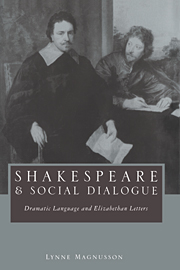Introduction
Published online by Cambridge University Press: 22 September 2009
Summary
This book focuses on verbal interaction in the language of Shakespeare's plays and Elizabethan letter-writing. I argue that to make further advances in understanding Shakespeare's verbal achievement, it is necessary to turn attention away for a time from his private craftsmanship in words and to develop a better understanding of social invention in language – and of the richly complex rhetoric of social exchange in early modern England. We need to take a closer look at how language is organized as interaction, how dialogue and other verbal exchanges can be shaped by the social scene or context as much as the individual speakers, how “the word in living conversation” – in Bakhtin's intriguing formulation – “is directly, blatantly, oriented toward a future answer-word.” We need to know more about what everyday speech genres Shakespeare had to draw upon; how language demarcated class, social position, and relative power in Elizabethan England; how friendship, subjection, authority, intimacy, alienation, enmity and the like were constructed and inflected in words; how the language scripts for early modern relationships might have constituted and reproduced patterns of social organization on the one hand or of individual psychology on the other; how relational scripts for friendship or service might have changed over time and changed, with them, the repertoire of available personal relationships.
- Type
- Chapter
- Information
- Shakespeare and Social DialogueDramatic Language and Elizabethan Letters, pp. 1 - 14Publisher: Cambridge University PressPrint publication year: 1999



